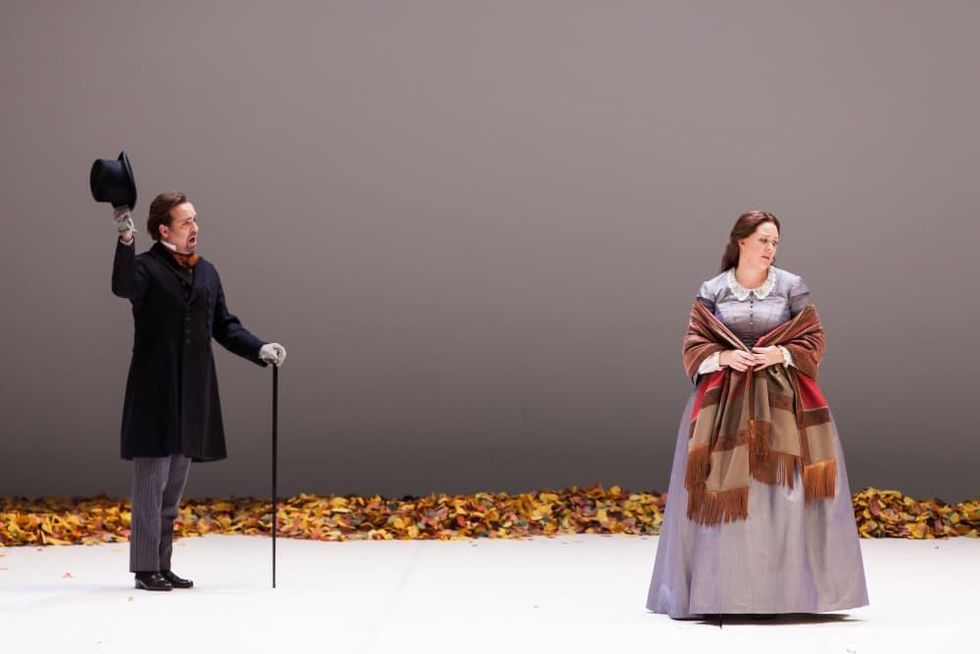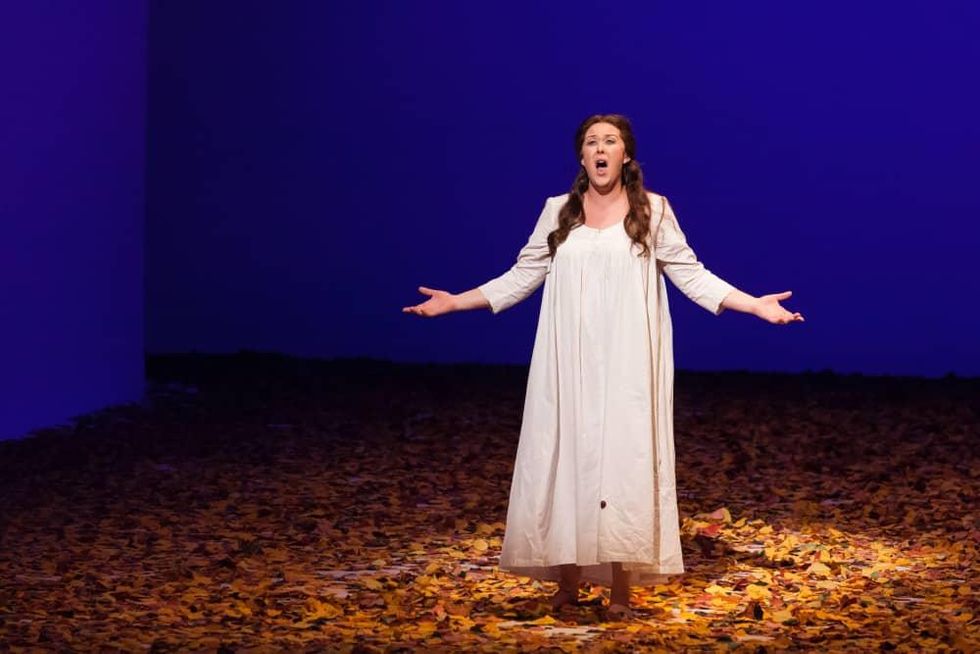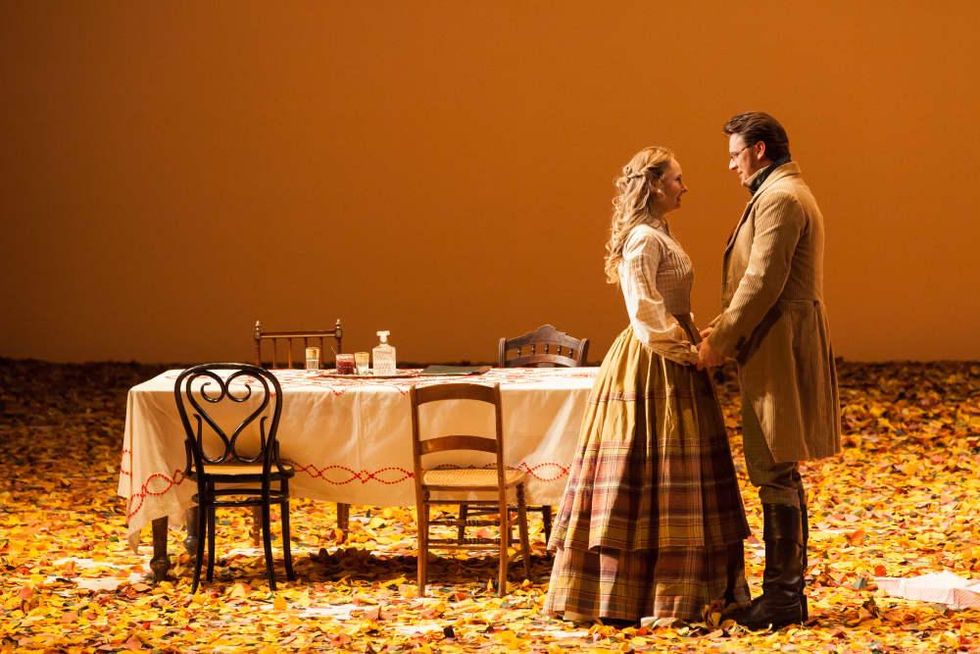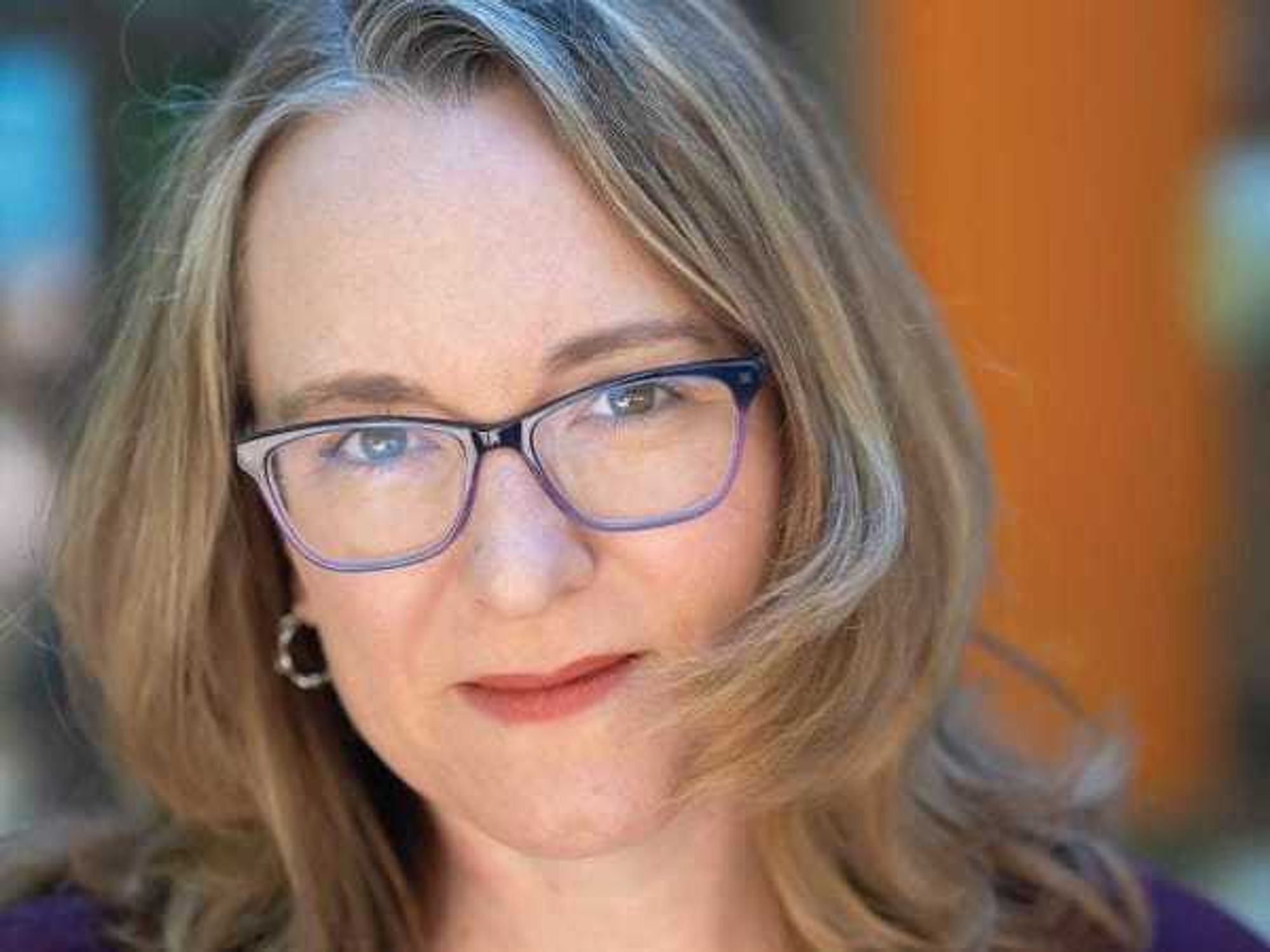The Review Is In
HGO's ambitious production of Eugene Onegin sparkles in quest for love
A letter, a dance, and a duel—such is the stuff of slow moving disaster in Alexander Pushkin’s novel Eugene Onegin.
A lit scrim, a bare stage, and a cascade of autumn leaves—such is the stuff of triumph in Houston Grand Opera’s production of Peter Ilyich Tchaikovsky’s opera Eugene Onegin, which runs at the Wortham Theater Center through November 13.
The production was the real star this night at the opera. Certainly there were standouts in the cast, but the effortless scrims, the spare staging, and the gorgeously saturated lighting of Christine Binder made Tchaikovsky’s gem sparkle.
An Ambitious Production
This Canadian Opera production premiered at the Met in 2008 and benefits not only from Binder’s masterful lighting but from the deft touch of Robert Carsen and costume designer Michael Levine.
What makes this Onegin especially welcome is its well-realized ambition. Opera is often the world of the overdone and the over-the-top. Sometimes that’s pleasing, sometimes painful. What you learn watching this one is that it takes very little staging to create drama and that vast and open negative space allows us to see more clearly than the clutter of props and sets.
The production understands the social world through geometry. The opera features quite a few group numbers — workers and young girls singing about harvests and love. So staging features circles and squares and other units that make us aware of the fact that every love story — comic or tragic, old or new — is a story about the nature of community. Only the lovers are foolish enough to believe they’re the only ones in the world.
What becomes especially clear is that HGO is at its best when it chooses a production like this one or LaFura dels Baus ongoing Ring or the wonderful trio of operas—The Italian Girl in Algiers, La Cenerentola, and The Barber of Seville—by Spanish trio Joan Font, Xevi Dorca and Joan Guillén.
This Onegin is ambitious in yet another way. Tchaikovsky’s operas are by no means the most performed or the most familiar to American audiences, which probably had more to do with the sparse audience than did the approach of Halloween. And yet this is the second Tchaikovsky I’ve been fortunate enough to see at HGO, including the haunting 2010 production of Queen of Spades.
A Star is Born
There’s much to make theater-goers happy even as the opera exposes the declining fortunes of its characters. Puskin’s novel in verse, Eugene Onegin, tells the tale of unhappy people only ever capable of making themselves unhappier. The thoughtful Lensky falls in love with Olga, the flightier of two sisters, even though the pensive Tatyana should be more his style.
Tatyana, however, falls for the pretentious Onegin, who cynically rebuffs her. Later there will be jealousy and a duel and a meeting years later when Tatyana is happily married. But before the catastrophe unfolds, her impulsive love propels a meteoric rise to heights of eloquence. All night she struggles to write a letter in what’s become an iconic scene.
Happily, Katie Van Kooten, rises to the occasion. She was, in fact, stellar.
Eugene Onegin is oddly undramatic, in spite of vivid party scenes and a deadly duel. It is, much like Tatyana, trapped in its own head. Tatyana is at first painfully introverted, always reading novels and dreaming of desolate lovers. It takes a lot to break through the haze of melancholy and pensiveness that pervades Onegin, and the clear, quick, passionate singing and acting of Van Kooten did just that.
Finding the Drama
Others struggled to project themselves and convey the inner drama. To be fair, even Tchaikovsky called Onegin not an opera but “lyric scenes.” But this was also a matter of the cast. Megan Samarin looked the part of the bored and capricious Olga but failed to too much of an impression. Norman Reinhardt was a passionate Lenksy who made the most of a blue-lit aria before his fatal night duel with Onegin, but he otherwise struggled not to be covered by the orchestra, as did Scott Hendricks as Onegin.
At first I thought conductor Michael Hofstetter might have let the orchestra run over the singers a bit, which perhaps he did at first. But his exquisite control of dynamics in the second act proved otherwise. As did the utter standout Russian bass Dmitry Belosselskiy, who plays Tatyana’s eventual husband, Prince Gremin. This is a man whose potent and utterly arresting voice you can feel deep in your spine. Call me a cultural chauvinist, but there’s also simply nothing like Russian sung by a native speaker.
Hendricks’ Onegin was often passionate but he struggled to portray the complexity of this world-weary cynic. There’s no question Onegin is a jerk, but is that all he is? And if that’s all he is, why on earth are we watching? We might want an Onegin who gives a bit more of a reason to care.
Everyone’s in love in Eugene Onegin and everyone’s a failure at love. Early on two older women recollect past loves and disagree about whether “thrilling love is best” or whether “routine is a gift from above.”
Love is a question no one can answer, which explains why these character retreat in to novels and poetry. There’s really nothing to do but watch the autumn leaves flutter down.



